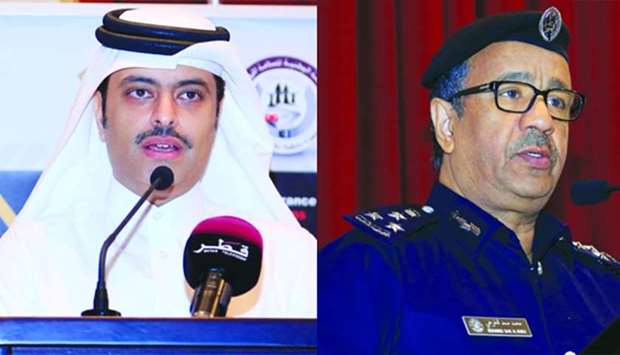The General Directorate of Traffic, National Committee for Traffic Safety, Hamad Medical Corp, Transportation Studies Centre at Qatar University and Ministry of Interior's Public Relations Department jointly observed the World Day of Remembrance (WDR) for Road Accident Victims at the General Directorate of Traffic in Madinat Khalifa.
The day was observed with an ambitious UN plan to reduce the number of road fatalities and serious injuries by 50% by the end of 2020.
WDR is commemorated on the third Sunday of November each year to remember all those killed or injured in road accidents.
Brigadier Mohamed Saad al-Kharji, Director General of the General Directorate of Traffic said: "We commemorate the International Day of Remembrance for Road Accident Victims by recalling the tragedy of the victims of accidents and evaluating the efforts of the police, ambulance and civil defence in traffic safety and also as a reminder of the big losses in accidents.
Al-Kharji remembered the United Nations plans to strengthen the efforts in this framework, which has been ratified by all countries and called 'Plan of Decade 2011-2020' which invites all countries to reduce the number of deaths by 50% by 2020.
Regarding the role of the health sector, post-incident response and the reduction of fatalities and serious injuries on roads, Sheikh Dr Mohamed bin Hamad al-Thani, director of the Public Health Department at the Ministry of Public Health said: "It is important to remember that road accidents claim nearly 1.3mn lives worldwide each year (average of 3,287 deaths daily) in addition to between 20mn and 50mn injuries each year causing continuous disability for victims."
The injuries resulting from traffic accidents are the main cause of death among people in the age group 15-29.
The senior official added the Ministry of Public Health is concerned with the response after road accidents to save the injured drivers, passengers and pedestrians, and also reduce the number of serious injuries and its complications.
“Among the initiatives adopted are improving communication services for the ambulance service, providing more than 1,450 ambulance personnel responding to thousands of calls. This has led to reduce the telephone response time to about five seconds, and the arrival time to the scene seven minutes inside Doha, and eight minutes outside”.
Lt Col Mohamed Radhi al-Hajri, director of Media and Traffic Awareness Department at the General Directorate of Traffic spoke about the objectives of awareness and its role in spreading traffic awareness among the different types of the communities.
Dr Kim Jraiw, director of the National Traffic Safety Office (NTSO) deliberated on Qatar's vision for traffic safety and the requirements of the United Nations Plan for the Decade 2011-2020 and the efforts of the country to support and improve traffic safety.
The NTSO official said there are three challenges faced by the rich, poor, and developed or developing countries.
They are traffic safety, cities and congestion, and economy and national security and these challenges can only be effectively met through successful safety plans.
Al-Kharji honoured a number of the participants including Sheikh Mohamed al-Thani, Sheikh Dr Hassan bin Ali al-Thani, Mariam al-Mannai, Talib Afifah, accidents victims Ahmed al-Shahrani and Rashid al-Humaidi.
On the sidelines of the activities, an awareness exhibition was held with the participation of a number of authorities concerned with road safety, to educate the public on road safety procedures.

